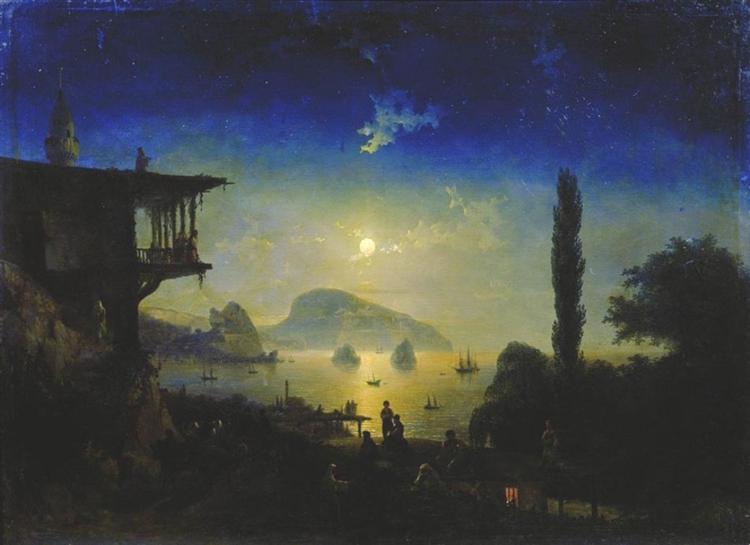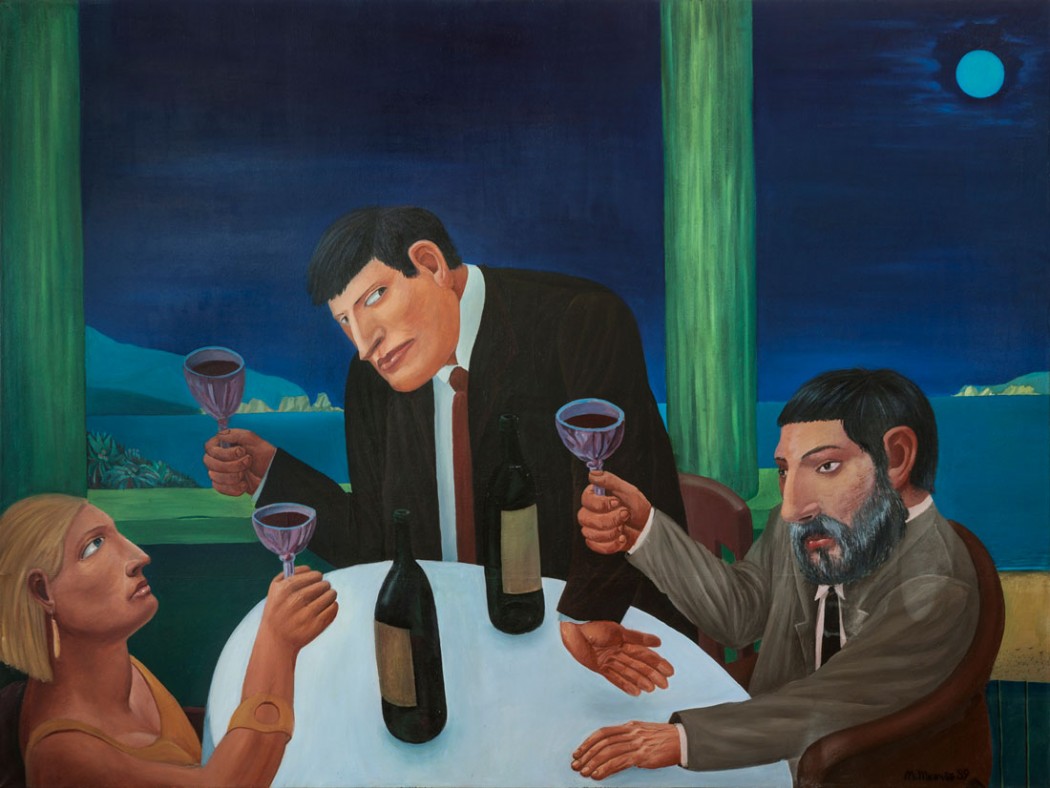At first you don’t notice it, but then, really, even to the contrary. The central figure on the painting reminds you of Putin. It represents the inside of Vladimir Vladimirovich Putin and the Putinist world view in a simple way. Like when an actor is hired to represent a famous person in a low-budget movie, one who hardly resembles the living or deceased great personality. As intrigue transports the plot further along, the actor begins to look more and more like the person he’s meant to represent.

And this is extremely interesting. The background landscape of “Premonition” is very similar to the Crimean landscapes painted by Ivan Aivazovsky in the 19th century. See for example ‘Crimean coast, 1886’ or ‘Moonlit Night on the Crimea. Gurzuf, 1839’ and ‘Gurzuf Night, 1849’ or especially ‘Night at Crimea View on Ayu-Dag, 1859’ – some of the paintings painted on the ‘lunatic’ coast of Crimea.
***
The bigger the Motherland the smaller its citizens
You know the Russian matryoshka-dolls that are inside each other and can be opened, from the biggest to the smallest one? Moscow’s logic is a reverse version of the matryoshka: Moscow’s politics open up so that inside each doll that is opened there is a bigger doll. We have now opened a fifth doll and we can no longer even guess how many new dolls we are going to see. Politics can resemble physics in that it is predictable to an extent. Russian politics today bears no semblance to physics whatsoever.
The Eastern border of Europe has shifted to the center of Europe. Almost all of the Eastern border of Europe is filled by Russia. And officially, Russia is Putin.
Russia is one, but Putin is not alone. No gangster is without a gang. Putin is not acting alone. His activity grows out of, and is rooted in internal politics, protecting his own power. Putin is totally dependent on the network of lies created in his tightly controlled information space. The issue is about narrative politics, where storytelling leads the nation. Will the nation be able to listen to the story until its end, or will the end be a different and feared one? We’ll know only later, only when we’ll know. Until that we only guess.
To what extent can Russia return to the Soviet Union? A party of one person, Gulags and a continent of mass murder? If so, then at some point they’ll run out of prisons. Almost everyone will have to be arrested, as everyone is a suspect.
Not all guesses are without knowledge. But at the moment we can only remain guessing. We still don’t know where Putin was. The only thing people seem to have consesnsus of is that things will not revert to the same situation as we had before Putin disappeared.
By displacing common values, or even their possibility, Russia has dislocated itself away from Europe. Asia hasn’t expanded either. But Russia has moved to a place that does not belong in any continent. Borders are important for Putin. Borders of states, of politics, of money. But they are not hindrances. Russia wants to be itself and grow. It has remade itself into an oxymoron that solves no problem but attempts to industrialize its capacity to further create clusters of geopolitical problems while it tries to dominate the world.
[stextbox id=”black” caption=”The Mona Lisa of Bribe and Corruption” mode=”js” image=”http://upnorth.eu/wp-content/uploads/2015/03/Predtshustvije_orig.jpg”]Remarkable 1991 painting Предчувствие (Predchustviye = premonition) by Mikhail Tkachev. All you need to know pic.twitter.com/Om0z6Qw294
— Edward Lucas (@edwardlucas) September 29, 2014
Just before the Soviet Union was about to collapse, in 1989, the artist Mikhail Tkachev succeeded in capturing a part of the Russian mind which is hard to see from outside if you don’t know the people intimately.
The painting, while known as the “Mona Lisa of Bribe and Corruption” because of the secretive expression of its main character, is generating global attention because of its original title “Predtshustvije” (Предчувствие). It means ‘premonition’.
Mikhail Tkachev foresaw something which wasn’t going to change, the Russian official’s mentality and his attitude to the others. In the time of general optimism the artist didn’t choose the obvious mood – rather the opposite. What makes the painting even more important today is its location – Crimea. Was that the premonition Mikhail Tkachev was predicting in the late 1980s?
Mikhail Tkatchev’s painting “Predtshustvije” is one of the most significant works of art to describe the current zeitgeist of Russia. It was painted at the time when the Soviet Union was in its second last life year, 1989, the year when the Berlin Wall came down. The ’Stimmung’ of the painting, and the name “Predtshustvije” put it into a fiercely mystical and mythological framework. The artist has managed to predict the future of Russia. It has slowly been revealed to the rest of the world that Russia has changed the whole structure of global politics into an unpredictable mess of ongoing insecurity.
When Putin took office he promised to fight corruption. It was one of his first public tasks in the beginning of his career as the head of state. But already then, very odd things started to happen. The war in the Caucasus was restarted, bombs exploded close to the Kremlin, apartment buildings with people inside were blown up – all within months after Putin came to power.
Art rarely expresses social situations and even more rarely, predictions about the future. One has hardly ever seen a man like the one in the painting. He is kind of a “Mona Lisa” of Bribe and Corruption, the morals just the opposite to what makes the face of “La Gioconda”, the real Mona Lisa glow.
[/stextbox]
Russia’s official ears do not listen as it communicates with the world, and its mouth is paralyzed by lies. People have sought to find peace between Ukraine and Russia by negotiating. How can you negotiate with men who talk only to themselves, even when they talk out loud?
When reality is messed with: things get messy. Why did we not know about the lies earlier? Lies are an essential part of human communication, but they are normally much more subtle. Russian political articles now mean the opposite of the words in it. When a lie told by you echoes back into your ears, it can sound like the truth. This is the logic of Russia. Here the actions have been consequent.
Lies and violence have led to the sanctions against Russia. The politics of sanctions makes citizens the dead heroes of their own lives.
To what extent can Russia return to the Soviet Union? A party of one person, Gulags and a continent of mass murder? If so, then at some point they’ll run out of prisons. Almost everyone will have to be arrested, as everyone is a suspect. Then every citizen will be made into a prisoner and a guard. Each one watches one another, everyone follows and is followed. Every now and then prisons will be emptied, because mad killers as well as dead bodies are needed on the fronts.
The worst is yet to come.


